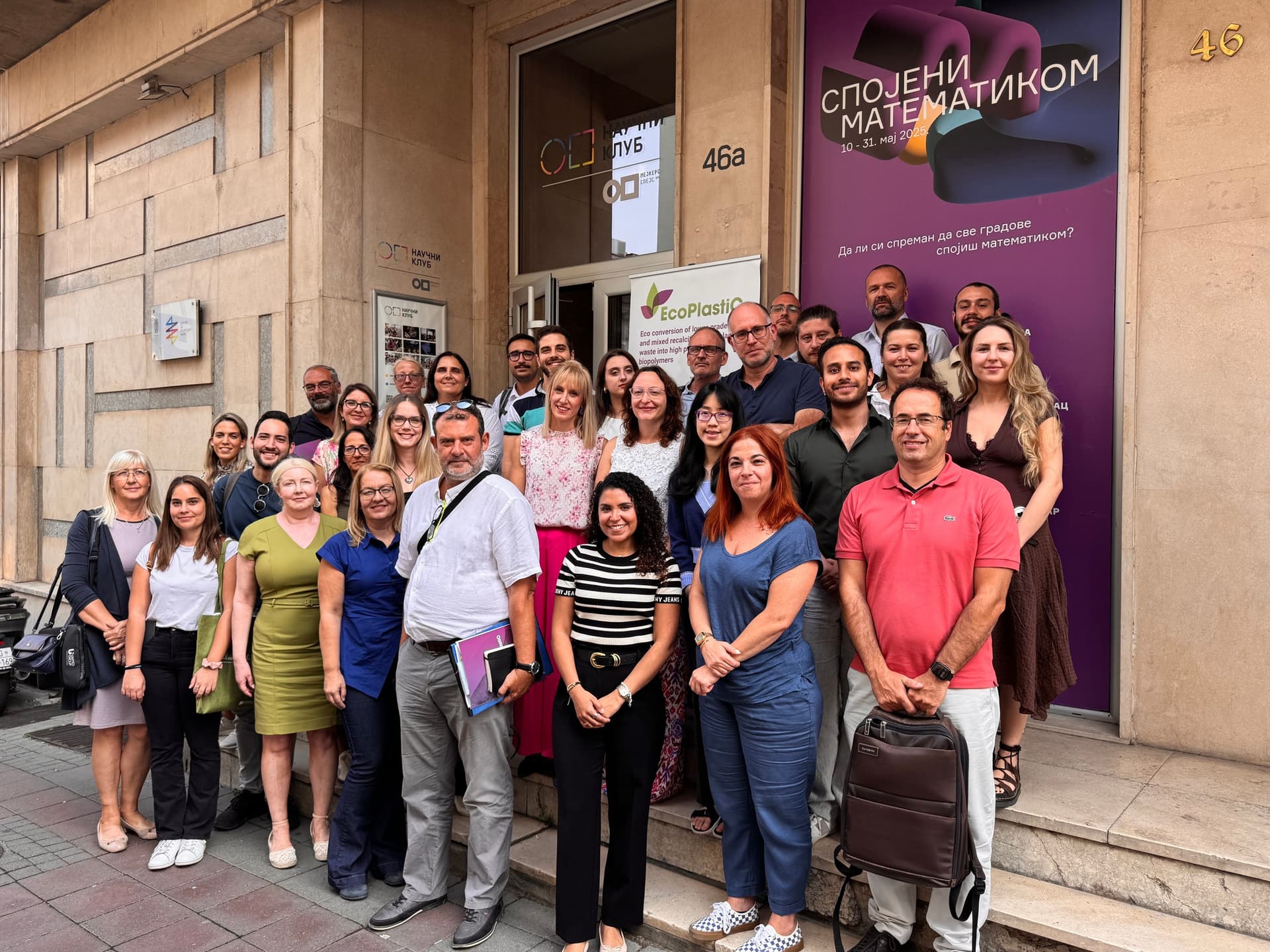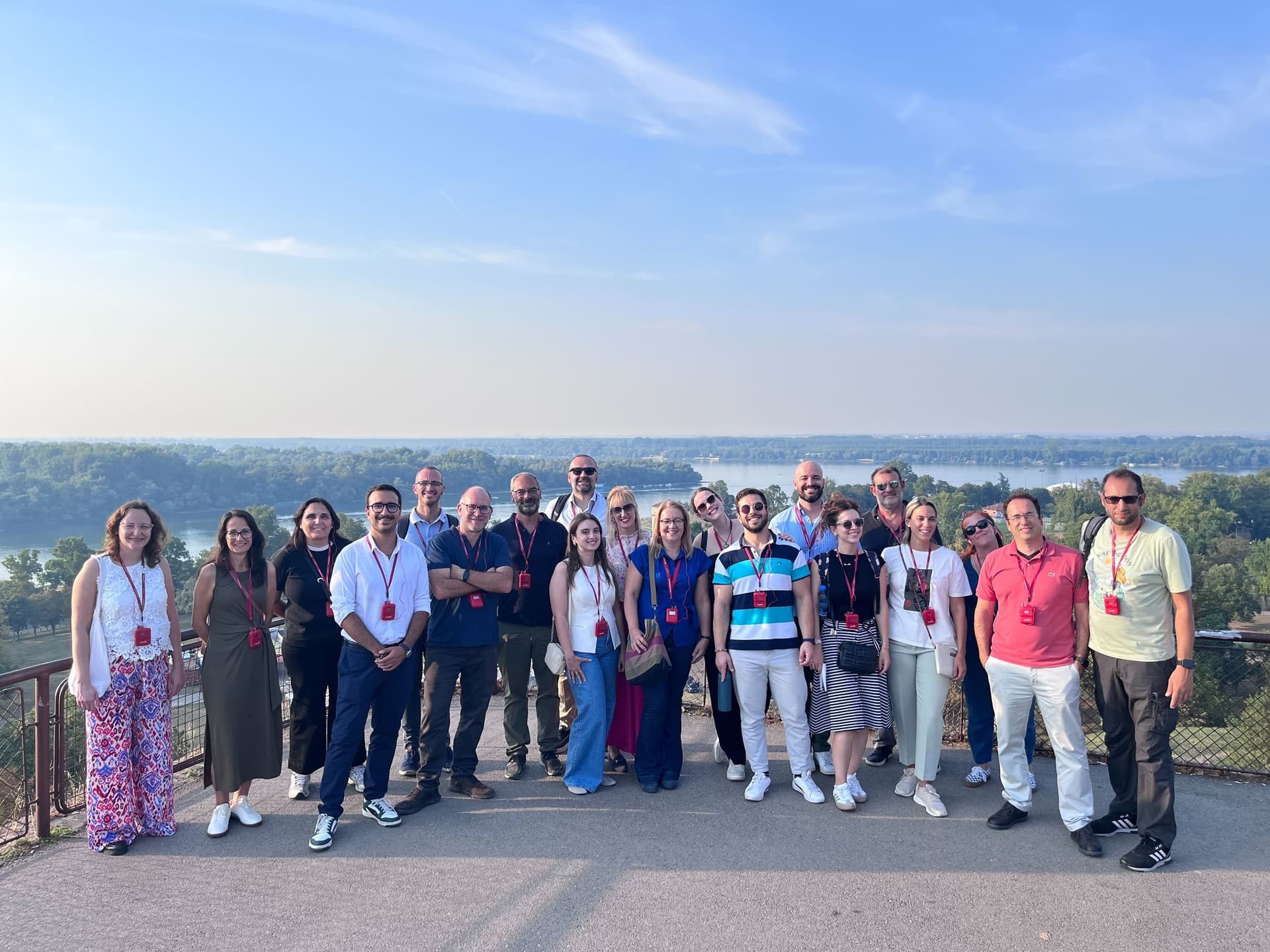EcoPlastiC General Assembly IV

The fourth and final EcoPlastiC General Assembly took place on 4 September 2025 in Belgrade (Serbia). The GA provided an opportunity for all European partners from Ireland (TUS), Belgium (Avecom), Portugal (NOVA), Serbia (IMGGE) and Sweden (KTH)to meet in person, summarise the overall achievements for each Work Package (WP), define the final steps of the project and draft the plans for beyond the project.
This meeting was organized jointly with the TwInn4MicroUp General Assembly, as these two projects share the vision, mission and fields of research, pushing boundaries of science behind bioplastics. Prof. Aggelos Tsakanikas from NTUA Technology Transfer Office gave a talk on “Intellectual property and commercialization potential of research outputs” and Dr Anthi Karnaouri shared insights on “Exploring fungi and their enzymes for biotransformations: From plastic degradation to furan oxidation and functional materials”.
Both meetings were fruitful and full of discussions, and the networking and collaborations will continue beyond the end of EcoPlastiC project.

EcoPlastiC & TwInn4MicroUp teams at the Centre for the Promotion of Science in Belgrade
Overall, processes for post-consumer PET textiles and enzymatic degradation were developed within EcoPlastiC. Recovery of 97% TPA from mixed plastics was achieved. Production and extraction optimization of PHA recovery from biomass was carried out using green procedures with up to 96-97% purity. 50% reduction in energy use and CO₂ emissions compared with fossil fuels monomer production as per the project’s Life Cycle Assessment. Regarding the commercialisation, a feasibility study was performed by a company where the bioadhesives were identified as the most promising product.
Within WP2 (Green depolymerization of mixed PET waste plastics), TUS presented the development of green chemical processes for efficient PET monomer yield and biotechnological clean-up, even from challenging mixed PET streams. Over 99% of TPA yield was recovered from mixed PET (including textiles and metallised plastics) via REX (reactive extrusion). LCA analysis confirmed the process is environmentally viable, with energy intensity & EG emissions as improvement targets.
Within WP3 (Design and optimization of the AVE microbiomes), AVE investigated a total of 39 microbial strains, including 29 newly isolated strains. Both mixed and pure cultures were examined and aerobic processes were found to outperform anaerobic ones in terms of overall efficiency. Among the pure cultures studied, Delftia tsuruhatensis and Gordonia nicotianae yielded the highest levels of microbial protein production, with protein contents reaching up to 80%. The most promising PHA production was achieved using NOVA’s mixed culture, with PHA contents reaching up to 40%. Despite slightly lower productivities, mixed cultures offer a more cost-effective and scalable solution.
Within WP4 (Recovery of PHA), NOVA focused on three biological processes that were developed for the valorization of mixed PET waste degradation products, progressing from lab scale to scale-up: (1) PHA and biomass production by a mixed aerobic culture was successfully scaled up to 25 L; (2) Protein-rich biomass production using Glutamicibacter nicotianae strain 24A was scaled up to 10 L. (3) PHA production by the newly isolated strain DM-14 was achieved, with a PHA content of 17%. Furthermore, 80-100% biopolymer recovery was achieved without compromising polymer properties by enzymatic procedures with commercial and recombinant enzymes. Plastic materials were developed from mixed culture biomass and strain 24A biomass. For the same WP, IMGGE developed a novel enzymatic cocktail - crude protein mix from Tenebrio molitor, for efficient extraction of all biopolymer types (PHB, PHBV and mcl-PHA) reaching 60-100% recoveries, and 5 times lower enzyme load in comparison to commercial enzymes. Solvent-based methods were explored where 55% biopolymer recovery was achieved for PHBV, PHO and mcl-PHA. Thymol-based NADES showed to be efficient in recovery of PHB (up to 92%) with solvent recycling. Novel eco-materials were developed: Bio-PUs (bacterial biomass as filler and mcl-PHA based polyurethanes.
Within WP5 (Processing and packaging prototype), KTH was developing films with both low- and high-PHA content biomass in TUS, each exhibiting distinct mechanical and barrier properties. Especially, valpromic biomass improved oxygen barrier properties of the films. SCP-based adhesive outperformed commercial Pritt glue sticks and performed in parallel with superglue on paperboard substrate. This has the potential to be used as packaging sealants for dry applications. At IMGGE, a prototype sneaker was developed and 3D printed from bacterial PHB, in collaboration with Sferikon design.
Within WP6 (Dissemination, Exploitation & Communication), IMGGE reported that all KPIs have been met, and that website is performing excellently. Many promotional materials were given to attendees. They announced the release of the final EcoPlastiC Newsletter #4 at the end of September 2025. Special emphasis was also on the DEC (Dissemination, Exploitation and Communication) and DMP (Data Management Plan) implementation and finalization of the DEC and DMP final deliverables.
Representatives from all partner institutions attended the GA, and so did the collaborators from NTUA, UNIBA and EUTA:
TUS (Ireland) - Margaret Brennan Fournet (Coordinator and Team Leader), Laura Rodriguez Garcia, Bor Shin Chee, Cuneyt Erdinct Tas, Buket Alkan Tas, Eduardo Lanzagorta Garcia (Project Ambassador), Necdet Ozcelik, Zeliha Ece Ozcelik
AVE (Belgium) – Aleksandra Bogdan
NOVA (Portugal) - Filomena Freitas (Team Leader), Cristiana Torres
IMGGE (Serbia) - Jasmina Nikodinovic-Runic (Team Leader), Jelena Simic (Project Ambassador), Marijana Ponjavic, Sanja Skaro Bogojevic, Jelena Milovanovic, Milica Ciric, Dusan Milivojevic, Ivana Aleksic, Vukasin Jankovic, Lena Pantelic, Milan Slavkovic
KTH (Sweden) - Mikael Hedenqvist (Team Leader and Project Ambassador)

EcoPlastiC & TwInn4MicroUp during the tour of Belgrade
We are happy to report that in the closing chapter of EcoPlastiC we can reflect on successful milestones and celebrate the project’s impact. Our work and results point to future directions in sustainable innovation.